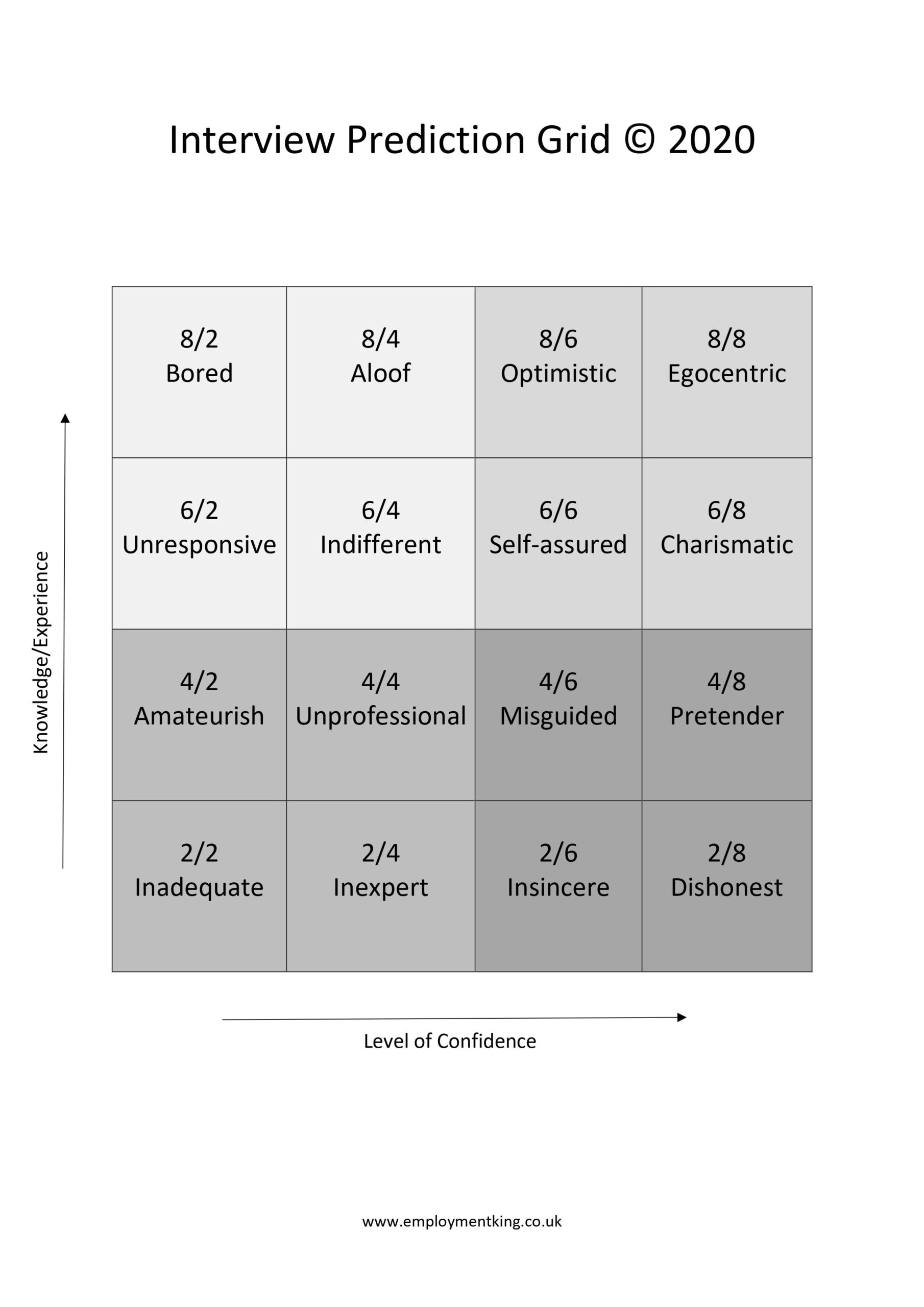Congratulations on completing the Interview Prediction Grid Test (IPG) ©2020.
Below is a breakdown of your Interview Identity
6/8 – Charismatic
When all applicants have a wealth of experience and are able to confidently communicate their competencies, the interviewer will struggle when forced to choose one of the equally skilled interviewees.
It is often the smallest of things that can change the job interview outcome. Decisions can be made at the emotional level, not logically. It is this reason why the 6/8 – Charismatic applicant can have, in some interviews, an advantage over the 8/6 – Optimistic interviewee. The charismatic medium rather than high level of knowledge/experience, twinned with their high level of confidence creates a charming effect.
A medium knowledge/experience means that not all of the answers will be perfect. This lack of perfection, combined with a natural confident delivery, increases rapport as the illusion of vulnerability and authenticity is created. Interviewers, when making emotional decisions, buy-in to the individual, not the polished, faultless, and often robotic presentation of other high/high applicants.
With an above average competency level, industry knowledge is expressed well with the applicants, due to having the highest levels of confidence, repeatedly alluding to their accomplishments. It is the constant self-praise, used when referencing the job criteria, that concludes in a high-scoring interview.
The barrier is that other more experienced applicants may possess a PhD as an example, or a specialist skill that can only be obtained with 10+ years’ industry experience. To counter this, the often overly confident interviewees may attempt to frame answers in a way that creates the impression of having a knowledge level that they don’t possess.
Applicants have to be careful not to fall into the trap of sticking to their guns when challenged by an expert interviewer on a point they themselves are not an expert in. A lack of expertise, along with an argumentative approach (a common trait for an over-confident applicant) can break the charismatic spell.
Strengths
Few people have the ability to inspire awe in others.
Being charismatic doesn’t require someone to be wholly extroverted. Instead the charisma comes from presence. Interviewers, and people in general, are captivated by the communication style of a charismatic person.
In the job interview, the 6/8 – Charismatic interviewee is able to charm and influence the interview panel with a passionate and enthusiastic approach, gained through self-confidence, along with strong interpersonal skills.
The applicant’s openness and easy manner helps the interview panel to feel relaxed and comfortable. Another trait of charismatics is the ability to focus their whole attention on whoever is speaking, making the speaker feel important and appreciated.
They themselves are excellent orators, able to build trust through their unique positive communication style. Sentences are hypnotic, intriguing, interesting and informative. Listening to a charismatic speaker feels like you are watching a show.
Everything about a charismatic individual oozes likeability: warm smile, natural use of gestures, confident body language, eye contact, the ability to make small talk, storytelling, and detailing the job criteria.
When asked challenging questions, designed to put an interview on the backfoot, the charismatic interviewee doesn’t hesitate. The reply details the job criteria and is delivered in an entertaining way. Even questions on weaknesses are reframed with the focus being on what the applicant learnt from the situation, not the mistake itself.
This openness to share mistakes makes them seem more ‘human’ increasing their perceived employability potential. When in their element the 6/8 – Charismatic applicant won’t pretend to know all sector-related information. Instead, they use their gift as a conversationalist to uncover what details the employer was expecting and to frame the most relevant experiences to best meet the criteria.
Development
The medium rather high level of knowledge/experience is often the result of either a long duration in the industry while possessing a Level 4-5 qualification or a higher-level qualification but with only a few years’ sector experience.
Even with a charismatic personality, a lack of sector knowledge when compared to a more experienced applicant can be their undoing. An analytical expert interviewer may give a lower score when experiences are challenged and cross referenced against the scoring criteria on the interview scorecard.
Possessing a high confidence level leads to a natural ability to utilise rule 2 of a successful interview – self-promotion. By increasing knowledge on sector models and theories through a higher-level qualification or via direct experience, the 6/8 – Charismatic candidate can use any new learning to create higher scoring answers. But this option requires time.
Gaining an understanding of non-sector related models and theories that are relevant to the advertised position will benefit the applicant. An example of this could include a competent understanding of project planning, strategic thinking and commercial acumen for senior management roles.
Charismatic individuals are liked, even admired. The employer wants them to do well. With this in mind, an applicant can embed key phrases gained from identifying the job criteria throughout the job interview. The regular referencing of criteria can result in a positive assumption of the applicant’s suitability by the employer.
This is a dangerous game when challenged on any areas of low expertise. Better to gain the required skills and experience needed for a senior level position.

Advice for the job interview
- Highlight a wealth of knowledge by explaining how models from another job sector can be utilised within the position being applied for. Presenting new information helps an applicant stand out as most interviewees state similar experiences to each other
- Know the job criteria inside and out; in one answer reference one criteria while talking in detail about another. In the second answer, detail another criteria while referencing a previous criteria. This multiple referencing of criteria approach creates the perspective of someone highly knowledgeable
- Discuss future industry changes, new opportunities and sector threats, or industry risk, to show a strategic viewpoint
Research: IPG






